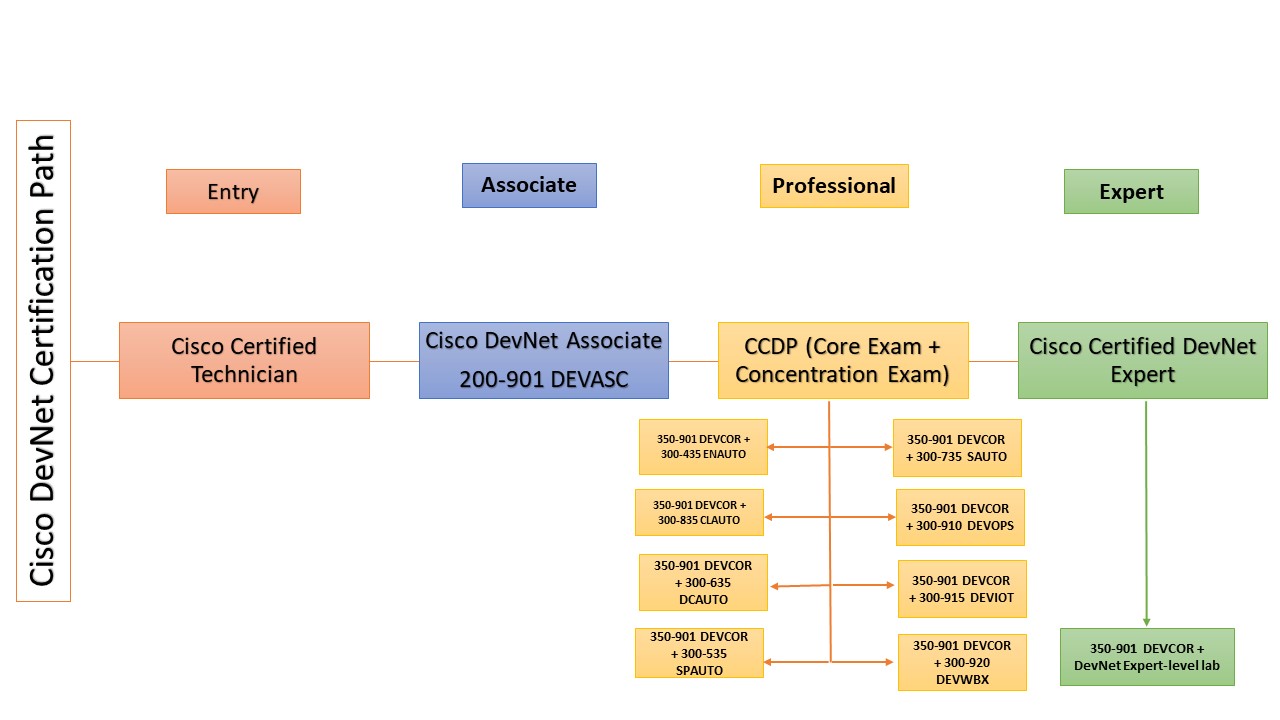The Developing Applications using Cisco Core Platforms and APIs (DEVCOR) course is designed to equip learners with the skills needed to implement modern applications that are scalable, maintainable, and can integrate with Cisco platforms. Through lessons on software development, API usage, Cisco platforms, Application deployment, and Infrastructure automation, students will learn how to design and manage robust applications. They will gain practical experience in constructing API requests, optimizing API usage, containerizing applications with Docker, and implementing security best practices. Additionally, they will delve into CI/CD pipelines, manage deployments with Kubernetes, and work with Cisco's APIs across various platforms like Webex Teams, Firepower, Meraki, and Intersight. By mastering these competencies, learners can enhance their careers in Network automation, Cloud development, and DevOps, making them invaluable in modern IT environments.

Disclaimer- Koenig is a Cisco Learning partner who is authorized to deliver all Cisco courses to customers residing in India, Bangladesh, Bhutan, Maldives, Nepal.
Purchase This Course
Cisco Learning Credits : 45
♱ Excluding VAT/GST
Classroom Training price is on request
You can request classroom training in any city on any date by Requesting More Information
♱ Excluding VAT/GST
Classroom Training price is on request
You can request classroom training in any city on any date by Requesting More Information
To ensure a successful learning experience in the Developing Applications using Cisco Core Platforms and APIs (DEVCOR) course, participants should meet the following minimum prerequisites:
These prerequisites are intended to provide a foundation that will help learners to fully engage with the course material and to maximize the benefits of the training. However, Koenig Solutions offers courses at various levels, and additional support is available for those who may need to strengthen their knowledge in specific areas prior to undertaking the DEVCOR course.
The Cisco DEVCOR course equips professionals with skills in developing applications using Cisco platforms and APIs for advanced software solutions.
The DEVCOR course equips learners with essential skills to design, develop, and debug applications using Cisco's core platforms and APIs, with a focus on scalability, modularity, and maintainability.
APIs (Application Programming Interfaces) allow different software systems to communicate with each other. Essentially, an API defines methods and data formats that applications can use to perform tasks like sending data or requesting services from an operating system, application, or other services. For example, when you use a map application on your phone, the app uses an API to pull data from a remote server to display traffic updates. This enables developers to build richer, more responsive applications by leveraging existing functionality rather than creating from scratch. APIs are crucial for developing interconnected software and creating user-friendly digital environments.
Cisco platforms encompass a range of technologies used to build and manage networks. This includes hardware like routers and switches, and software solutions for network security, collaboration, and data center management. They are crucial for businesses to create efficient, secure communication systems that can scale as needed. Cisco also offers certifications to validate skills in these technologies, with courses and exams (like the 350-901 DEVCOR) focusing on network design, implementation, and maintenance. These trainings prepare professionals to use Cisco technologies effectively in real-world environments.
Application deployment involves the process of distributing and installing an application onto a server or directly into a user’s computing environment. This can be done manually or automatically, using various tools and platforms. The goal is to make the application available for use by end-users, ensuring it operates correctly in the live environment. Successful deployment requires careful planning, management, and testing to troubleshoot any issues that arise during and after the software moves from development to production stages.
Infrastructure automation involves using technology to manage and provision computing infrastructure with minimal manual intervention. This process streamlines the setup, supervision, and operation of servers, databases, and other network components, making it faster and more error-free. It relies heavily on software to create repeatable instructions and processes, reducing the variability of human intervention and accelerating deployment. Automation tools help in configuring, managing, and orchestrating physical and virtual devices within an IT environment, enhancing efficiency and allowing IT professionals to focus on more strategic tasks. This leads to more stable and reliable IT operations.
CI/CD pipelines are automated processes in software development that help teams deliver code changes more frequently and reliably. "CI" stands for Continuous Integration, where developers' changes to code are automatically tested, ensuring that the new code integrates well with the existing codebase. "CD" stands for Continuous Deployment or Continuous Delivery, where validated code is automatically released to production environments. This pipeline minimizes manual errors, speeds up deployment times, and enhances overall productivity. Essentially, CI/CD is a crucial practice for DevOps teams aiming to achieve efficient and error-free software updates.
Kubernetes is a powerful system used for managing containerized applications across a cluster of machines. It provides tools to deploy applications, scale them as necessary, ensure their continued operation, and roll out new features or updates seamlessly. Essentially, Kubernetes automates the tedious aspects of managing applications, making it easier to handle clusters of hosted apps effectively and efficiently. This system is invaluable for developers who need to manage complex systems at scale while maintaining a smooth and reliable service for users.
Network automation is the process of automating the configuration, management, and operations of computer networks using software and tools. It allows network tasks to be performed automatically and more efficiently, reducing the need for manual interventions and the risk of human error. This includes tasks like deploying network configurations, managing network devices, and monitoring network performance. Network automation is increasingly important in modern networking environments, helping to improve network agility, reliability, and security. It also supports DevOps practices by enabling faster deployment and continuous integration of network changes.
Cloud development involves building and managing applications that operate in the cloud, leveraging cloud resources to enhance scalability, flexibility, and accessibility. This approach supports continuous development and deployment, allowing teams to release and update software quickly. It utilizes cloud platforms that handle underlying infrastructure, making it easier for developers to focus on improving application functionality and performance without worrying about hardware limitations. Cloud development is a key practice in modern software engineering, making applications globally accessible and resilient to local hardware failures.
DevOps is a set of practices that combines software development (Dev) and IT operations (Ops) to shorten the development life cycle and provide continuous delivery with high software quality. It emphasizes collaboration, automation, and integration between developers and IT staff. Through DevOps, teams aim for quicker release cycles, more efficient processes, and increased reliability of applications. By integrating DevOps practices, companies enhance their ability to respond to customer needs and improve product development.
The Cisco DEVCOR course equips professionals with skills in developing applications using Cisco platforms and APIs for advanced software solutions.
The DEVCOR course equips learners with essential skills to design, develop, and debug applications using Cisco's core platforms and APIs, with a focus on scalability, modularity, and maintainability.
